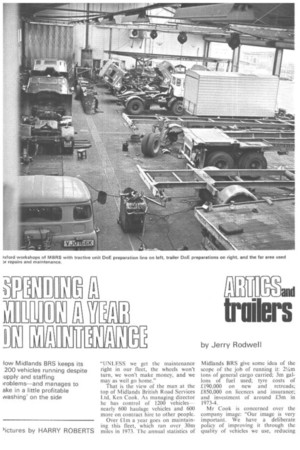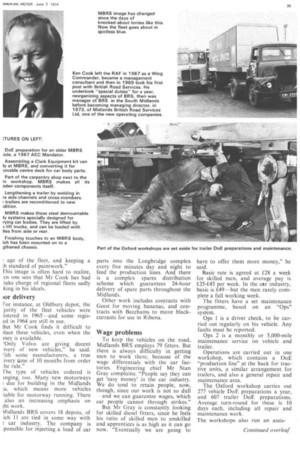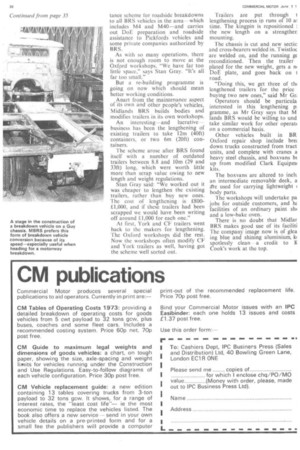by Jerry Rodwell
Page 35

Page 37

Page 38

If you've noticed an error in this article please click here to report it so we can fix it.
iow Midlands BRS keeps its 200 vehicles running despite upply and staffing iroblems—and manages to ake in a little profitable washing' on the side "UNLESS we get the maintenance right in our fleet, the wheels won't turn, we won't make money, and we may as well go home."
That is the view of the man at the top of Midlands British Road Services Ltd, Ken Cook. As managing director he has control of 1200 vehicles— nearly 600 haulage vehicles and 600 more on contract hire to other people.
Over Lim a year goes on maintaining this fleet, which ran over 30m miles in 1973. The annual statistics of
Midlands BRS give some idea of the scope of the job of running it: 21/4m tons of general cargo carried; 3m gallons of fuel used; tyre costs of £190,000 on new and retreads; £850,000 on licences and insurance; and investment of around Om in 1973-4.
Mr Cook is concerned over the company image: "Our image is very important. We have a deliberate policy of improving it through the quality of vehicles we use, reducing : age of the fleet, and keeping a ;II standard of paintwork."
this image is often hard to realize, en one sees that Mr Cook has had take charge of regional fleets sadly king in his ideals.
or delivery
For instance, at Oldbury depot, the jority of the fleet vehicles were ;istered in I965—and some regised in 1964 are still in use.
But Mr Cook finds it difficult to lace these vehicles, even when the )ney is available.
'Only Volvo are giving decent ivery of new vehicles," he said. rith some manufacturers, a true .ivery time of 10 months from order :he rule."
The type of vehicles ordered is inging, too. Many new motorways ; due for building in the Midlands ;a, which means more vehicles table for motorway running. There also an increasing emphasis on ;Fit work.
Vlidlands BRS covers 18 depots, of ich II are tied in some way with car industry. The company is .ponsible for injecting a load of car parts into the Longbridge complex every five minutes day and night to feed the production lines, And there is a complex spares distribution scheme which guarantees 24-hour delivery of spare parts throughout the Midlands.
Other work includes contracts with Geest for moving bananas, and contracts with Beechams to move blackcurrants for use in Ribena.
Wage problems
To keep the vehicles on the road, Midlands BRS employs 79 fitters. But there is always difficulty in getting men to work there, because of the wage differentials with the car factories. Engineering chief Mr Stan Gray complains: "People say they can get 'easy money' in the car industry. We do tend to retain people, now, though, since our work is not so dull and we can guarantee wages, which car people cannot through strikes."
But Mr Gray is constantly looking for skilled diesel fitters, since he feels his ratio of skilled men to unskilled and apprentices is as high as it can go now. "Eventually we are going to have to offer them more money," he said.
Basic rate is agreed at £28 a week for skilled men, and average pay is £35-£45 per week. In the car industry, basic is £49—but the men rarely complete a full working week.
The fitters have a set maintenance programme, based on an "Ops" system.
Ops 1 is a driver check, to be carried out regularly on his vehicle. Any faults must be reported.
Ops 2 is a monthly or 5,000-mile maintenance service on vehicle and trailer.
Operations are carried out in one workshop, which contains a DoE "production line" at the back for tractive units, a similar arrangement for trailers, and also a general repair and maintenance area.
The Oxford workshop carries out 277 vehicle DoE preparations a year, and 607 trailer DoE preparations. Average turn-round for these is 10 days each, including all repair and maintenance work.
The workshops also run an assis tance scheme for roadside breakdowns to all BRS vehicles in the area• which includes M4 and M40—and carries out DoE preparation and roadside assistance to Pickfords vehicles and some private companies authorized by BRS.
As with so many operations, there is not enough room to move at the Oxford workshops. "We have far too little space," says Stan Gray. "It's all far too small."
But a re-building programme is going on now which should • mean better working conditions.
Arian from the main.tenance aspect of its own and other people's vehicles, Midlands BRS builds bodies and modifies trailers in its own workshops.
An interesting—and lucrative business has been the lengthening of existing trailers to take 12m (40ft) containers, or two 6m (20ft) containers.
The scheme arose after BRS found itself with a number of outdated trailers between 8.8 and 10m (29 and 33ft) long, which were worth little more than scrap value owing to new length and weight regulations.
Stan Gray said: "We worked out it was cheaper to lengthen the existing trailers, rather than buy new ones. The cost of lengthening is £800£1,000, and if these trailers had been scrapped we would have been writing off around £1,000 for each one."
At first, York and CF trailers went back to the makers for lengthening. The Oxford workshops did the rest. Now the workshops often modify CF and York trailers as well, having got the scheme well sorted out. Trailers are put through lengthening process in runs of 10 al time. The kingpin is repositioned I the new length on a strengthen mounting.
The chassis is cut and new sectic and cross-bearers welded in. Twistloc are welded on, and the running gc reconditioned. Then the trailer plated for the new weight, gets a ni DoE plate, and goes back on 1 road.
"Doing this, we get three of tilt lengthened trailers for the price buying two new ones," said Mr Gr.;
Operators should be particula interested in this lengthening pi gramme, as Mr Gray says that M lands BRS would be willing to und take similar work for other operat( on a commercial basis.
Other vehicles built in BR Oxford repair shop include bre; down trucks constructed from tract units, and complete with cranes a heavy steel chassis, and boxvans hi up from modified Clark Equipm( kits.
The boxvans are altered to inch_ an intermediate removable deck, a dl-e used for carrying lightweight 1 body parts.
The workshops will undertake pa jobs for outside customers, and 1.1E• facilities of an ordinary paint sin and a low-hake oven.
There is no doubt that Midlar BRS makes good use of its faciliti The company image now is of glea ing blue and shining aluminium, lo spotlessly clean a credit to 14 Cook's work at the top.




























































































































































